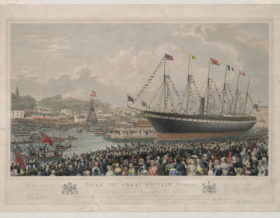Redesigning Europe
Following the upheaval in Europe during the French Revolution, and as the Napoleonic Wars came to an end, European powers came together to restore order through a set of agreements which restructured national boundaries and alliance systems. This was known as the Congress of Vienna. The diplomacy reflected a new framework for European relations. But it could not entirely erase the memory of revolution. In 1830, a violent coup in Paris saw the overthrow of the unpopular Bourbon dynasty; a month later, uprising in the Netherlands led to the new nation of Belgium.
In 1848 another revolutionary wave spread across Europe. Beginning in Sicily and Paris, region after region was paralysed by crowd action, cities thrown into chaos as police forces, armies, and rulers grappled with radical forces and demands, and many thousands of people killed and displaced. A Second Republic was declared in France, serfdom abolished in central Europe, and other major moves taken away from absolute monarchies and towards more open parliamentary democracies. However, in the final event, most of the revolutions that flared across Europe in 1848 were eventually shut down or watered down, accomplishing far less than their proponents had hoped.





